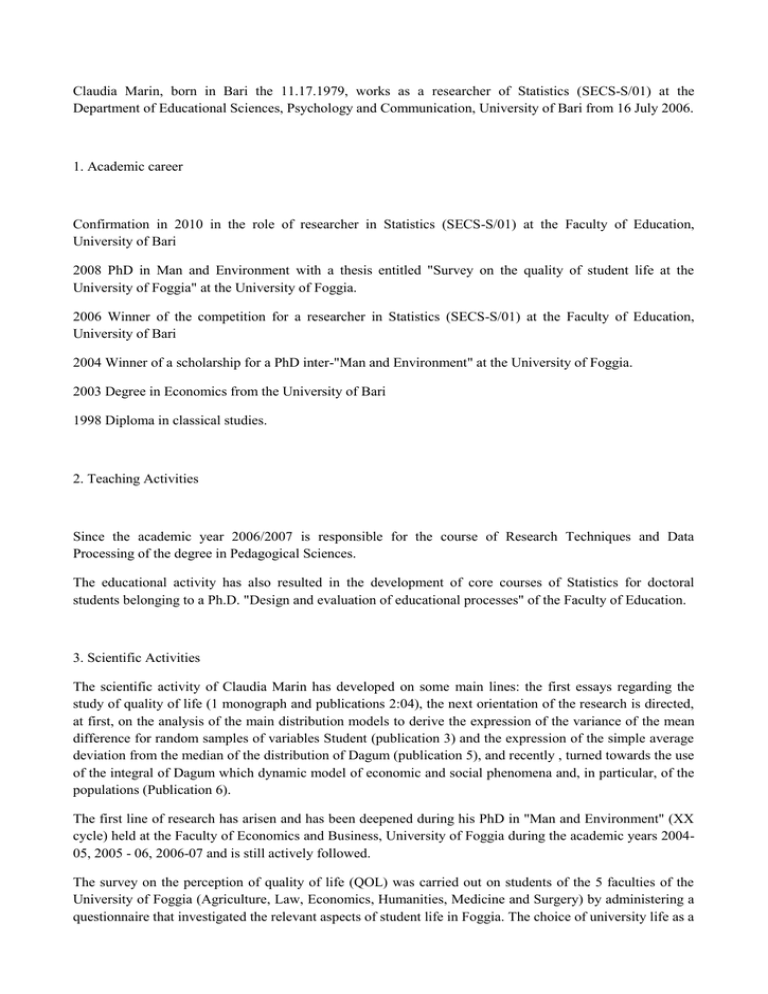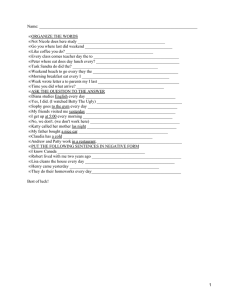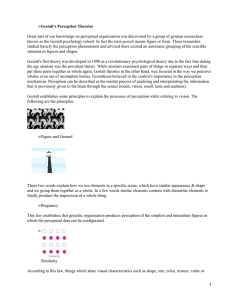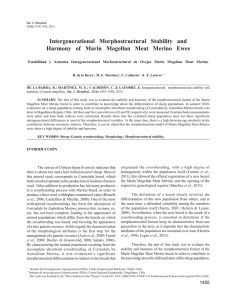Claudia Marin, born in Bari the 11.17.1979, works as a researcher of
Anuncio

Claudia Marin, born in Bari the 11.17.1979, works as a researcher of Statistics (SECS-S/01) at the Department of Educational Sciences, Psychology and Communication, University of Bari from 16 July 2006. 1. Academic career Confirmation in 2010 in the role of researcher in Statistics (SECS-S/01) at the Faculty of Education, University of Bari 2008 PhD in Man and Environment with a thesis entitled "Survey on the quality of student life at the University of Foggia" at the University of Foggia. 2006 Winner of the competition for a researcher in Statistics (SECS-S/01) at the Faculty of Education, University of Bari 2004 Winner of a scholarship for a PhD inter-"Man and Environment" at the University of Foggia. 2003 Degree in Economics from the University of Bari 1998 Diploma in classical studies. 2. Teaching Activities Since the academic year 2006/2007 is responsible for the course of Research Techniques and Data Processing of the degree in Pedagogical Sciences. The educational activity has also resulted in the development of core courses of Statistics for doctoral students belonging to a Ph.D. "Design and evaluation of educational processes" of the Faculty of Education. 3. Scientific Activities The scientific activity of Claudia Marin has developed on some main lines: the first essays regarding the study of quality of life (1 monograph and publications 2:04), the next orientation of the research is directed, at first, on the analysis of the main distribution models to derive the expression of the variance of the mean difference for random samples of variables Student (publication 3) and the expression of the simple average deviation from the median of the distribution of Dagum (publication 5), and recently , turned towards the use of the integral of Dagum which dynamic model of economic and social phenomena and, in particular, of the populations (Publication 6). The first line of research has arisen and has been deepened during his PhD in "Man and Environment" (XX cycle) held at the Faculty of Economics and Business, University of Foggia during the academic years 200405, 2005 - 06, 2006-07 and is still actively followed. The survey on the perception of quality of life (QOL) was carried out on students of the 5 faculties of the University of Foggia (Agriculture, Law, Economics, Humanities, Medicine and Surgery) by administering a questionnaire that investigated the relevant aspects of student life in Foggia. The choice of university life as a field of investigation led to consider both the urban environment that the university and, therefore, to identify specific aspects in which it may be limited perception of QoL of respondents. We wanted to investigate the life in your city and on the perception of urban services, means of transport and the quality of the urban environment, on leisure and on the perception of the facilities made available to students on the study and the personal aspirations of these last. Thanks to the application of factor analysis identified six factors were defined as the "well-being index urban", "index of perception of security", "index of lawlessness", "service index", "index of leisure" and "index of usability of the neighborhood." The results produced by this investigation have not been very positive for the city of Foggia and the most important towns in his province since the collective interviewed showed a poor life satisfaction in the fabric of the city ("urban livability index" equal to 5 , and 07 "index of urban malaise" of 6,32). From the academic year 2008-09, the research has contributed to obtaining the formal expression of the variance of the sample mean difference for the Student's distribution model in terms of the parameter g (degrees of freedom) and the amplitude sample n. Recently, the scientific activity has involved the study of the behavior of the scale and shape parameters in terms of variability in terms of absolute and relative variability by means of the expression of the simple average deviation from the median for the Dagum distribution. Deepening the lines of investigation Amoroso (the division of the logistics cycle into four phases that characterize the demographic development, stages he calls the spring, summer, autumn, winter) and Chiassino (the instantaneous rate of development of various demographic models, methods calculation of parameters of the same, as well as the concrete application to the dynamics of the populations of some countries), the last line of research is proposed in order to use the full length of the Dagum distribution model as a model of development of economic and social phenomena . This model will also have been studied in the articulation phases and the instantaneous rate of growth and it has been possible to highlight similarities and differences between the integral of Dagum and the logistic curve in canonical form. The scientific activity has also articulated in annual research projects, financed with funds from the University, which were: l techniques for the measurement of quality of life" (2007); 5. Publications 1. Claudia Marin, Survey on the quality of student life at the University of Foggia, Ph.D. "Man and Environment", University of Foggia, 2007; 2. Claudia Marin, The perception of quality of life: statistical analysis and factor analysis on the students of the University of Foggia, The culture of life, socio-demographic surveys on young people, Cacucci Publisher, Bari, 2008; 3. John Girone, Fabio Manca, Claudia Marin, On the variance of the mean difference for random samples of variables Student, Annals of the Department of Statistical Sciences "Carlo Cecchi", Volume VII, 2008. 4. Claudia Marin, Quality of life: definitions, models, surveys, Department of Historical Sciences and Geography, search paths, Cacucci Publisher, Bari, 2009. 5. Domenico Leogrande, Claudia Marin, The simple average deviation from the median of the distribution of Dagum, Department of Historical Sciences and Geography, Research Horizons, Cacucci Publisher, Bari, 2010. 6. John Girone, Claudia Marin, Antonella Nannavecchia, Dagum The integral model as a function of development, Department of Historical Sciences and Geography, Research Horizons, Cacucci Publisher, Bari, 2010. 7. Fabio Manca, Claudia Marin, The measurement of the degree of satisfaction of students on teaching by means of multivariate statistical techniques, assessment and quality of the universities. Models, methods and statistical indicators, p.43-52, ISBN 978-88-88793-49-8. 8. Fabio Manca, Claudia Marin (2012). A statistical approach to the non-verbal communication, Thoughts accomplices (research and reflections on communication, population, health and environment). BARI: CACUCCI PUBLISHER, ISBN: 978-88-6611-126-9. 9. Fabio Manca, Claudia Marin (2012). Small area estimation, the contribution of knowledge in education, p.260-278, Bari Progedit, ISBN: 978-88-6194-165-6.


